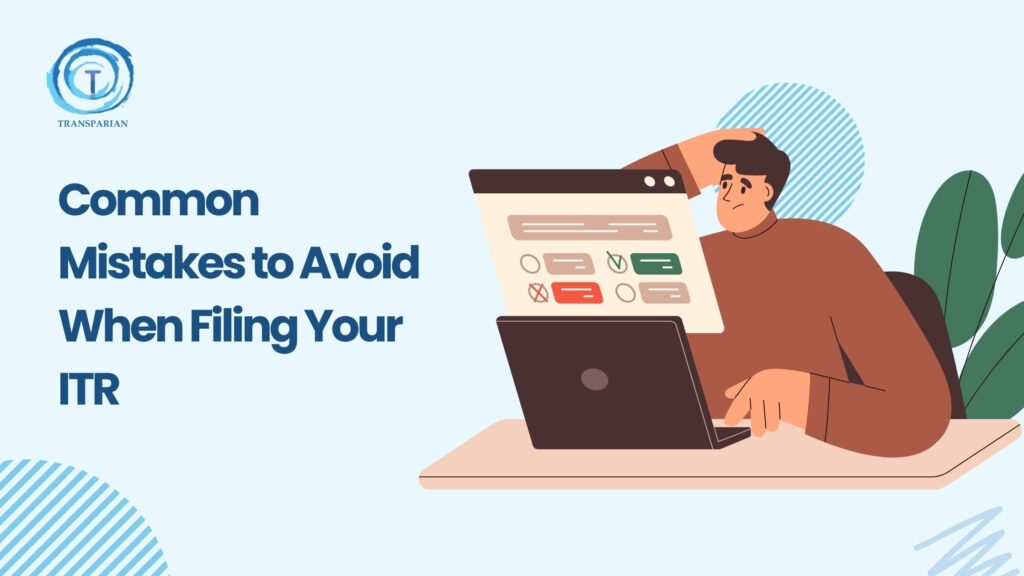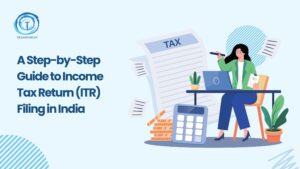Every person who lives in India must file their Income Tax Return each year. Consequently, well-versed taxpayers could still slip up and face penalties, have their refunds postponed, or come under the sharp eye of the Income Tax Department due to the constant changes in tax laws and ways of tax filing. The guide identifies the most common issues in leading blogs and highlights additional points that writers often overlook, especially for individuals or businesses dealing with property taxes, NRI taxation, and complex portfolios. You need to be aware of these issues, no matter if you choose to file by yourself or consult a specialist.
1. Choosing the Wrong ITR Form
It is common for people to choose the ITR form that does not fit their needs. All income tax forms are made for certain kinds of income and categories of taxpayers. For example, salaried individuals earning up to ₹50 lakh should use ITR-1, while those who have business income, capital gains, or own more than one property must use ITR-2 or ITR-3. If you choose the wrong tax form, the tax department may reject your filing until you correct it. Should you need help, check with an income tax consultant or make use of professional itr filing services.
2. Failing to Report All Sources of Income
It is frequent for companies to miss out stating all sources of income they have. This includes your main salary, along with dividends, rental earnings, interest on savings and fixed deposits, capital gains, and any freelance or consulting commission you earned after switching jobs. If you fail to report any of your earnings intentionally or by error, you may get notices from the tax office plus penalties and interest.
3. Not Reconciling with Form 26AS, AIS, and TIS
Make sure your declared income and the TDS deducted match the information given by Form 26AS, the Annual Information Statement (AIS), and Taxpayer Information Summary (TIS) before you file. Not meeting requirements can result in being asked for a refund, to pay additional taxes, or being checked by the government. If the income on which you paid tax isn’t listed in your Form 26AS, it won’t be counted when you file your taxes. Now, leading companies in taxes provide reconciliation tools that work automatically, but it’s good to double-check for safety.
4. Missing the ITR Filing Deadline
Individuals have till September 15, 2025, to submit their ITR for the 2024-25 financial year. Late submission can charge you a late fee of ₹5,000, take away your option of getting a refund, and in rare extreme cases, you could be penalized legally. Many taxpayers think that if they don’t owe tax, they do not have to file, but transactions above ₹2 lakh in international trips or ₹1 lakh on electricity always require one to file their tax return.
5. Not Verifying Your ITR
Filing the ITR is not the last process. Within 30 days of filing your return, you have to confirm it by sending ITR-V to the CPC in Bengaluru or by using e-verification. Being unable to verify your documents makes your return canceled and as if you didn’t file in the first place.
6. Not Pre-validating Your Bank Account
You can receive a refund only if the account you use is verified by the company. If your account is not validated, it may take a lot of time to get your income tax refund. Keep an eye on your profile and make sure all your bank information is correct and accurate.
7. Overlooking Exempt Income Declaration
Although the law exempts earnings like PPF interest, EPF maturity, and agricultural income from tax, you still need to report them in Schedule EI when you prepare your ITR. Not revealing any difficulty can raise concerns during the process of assessment.
8. Claiming Incorrect Deductions and Exemptions
Making false claims and not providing the relevant paperwork is a serious issue. Now that the authorities have updated the ITR forms, you must mention the policy number for 80C, the insurer’s name for 80D, and your loan account number for home loan deductions. Making a claim without proof or showing false information can make you miss out on your refund.
9. Errors in HRA and Home Loan Claims
Submitting fake papers or deducting HRA and house loan from the same house may bring strong penalties. The landlord should provide proof of payment in the form of rent agreements, receipts. Equal treatment rule now means the name of the lender, the account number for the loan. The sanction date are all required to be on your invoices.
10. Not Disclosing Foreign Assets or Income
Anyone living in Canada must report all the assets they hold overseas, including money and shares. Keeping this kind of information secret can cause people to face harsh penalties under the Black Money Act. NRIs also need to give correct details about their income and funds in India. There are a lot of blogs that don’t focus on the details of foreign asset reporting, yet it is very important for people who file their taxes internationally.
11. Ignoring Advance Tax or Self-Assessment Tax
In case your tax payment is more than ₹10,000 in a year, you have to make advance payments. If you don’t make the required payment, you will be charged extra interest. Remember to mention all taxes you have already paid so that you get the right amount of tax return.
12. Filing Too Early Without Complete Data
If you submit your ITR by June 15, you might face issues because Form 26AS or AIS may not show important financial details correctly. Many people encounter mismatches, experience delays in receiving refunds, or must correct and re-file their tax return due to incomplete information. It’s better to wait patiently unless you urgently need your ITR for a loan or visa.
13. Using Outdated Forms or Relying on Pre-filled Data
Whenever you do an assessment, download and fill out the newest ITR form because they are updated when new rules and laws are added. Not checking the data provided can be dangerous; double-check all the entries, and make sure to do this especially if you own different investment types.
14. Not Reporting Notional Rent or Vacant Property Income
When you own multiple properties, you need to list any unrented homes in your notional rent calculations. A lot of taxpayers still miss reporting income, which could attract the attention of the authorities. The same applies to property insurance payouts; they might have to be reported if the amount received is above certain standards.
15. Failing to Report Co-owned Property or Joint Home Loans
If you own an asset or have a loan with another person, make sure you both correctly share each person’s income and expenses. Incorrectly assigning money can cause errors in your tax details and may trigger a notice from the tax office.
16. Not Maintaining Documentation for Deductions
Failing to show proof for rent payments, insurance coverage, or sanctioned loans can cause your taxes to be disallowed during the assessment. ITR consultant and tax file consultant services often provide checklists to ensure you have all necessary proofs before filing.
17. Mistakes in Carry Forward and Set-off of Losses
In case you have losses in capital assets, business, or property, you must meet the due date to make use of them in the future through your ITR. In this case, you miss out on the chance to reduce your future tax payment with these losses.
18. Clubbing of Income Errors
You might have to report as income the money that comes from investments in the names of your spouse or children. People usually make this mistake, especially if they have many family members or several joint investments.
19. Not Seeking Professional Help for Complex Cases
If your finances are complex—multiple properties, foreign assets, capital gains, or business income—consider consulting a tax consultant in India or a reputable tax consultancy firm. These professionals offer tax consultancy services and itr filing services tailored to your profile, ensuring compliance and maximizing deductions. An increasing number of them now offer e-filing to make the process simple on the internet.
20. Overlooking Digital Asset/Crypto Income
As new requirements are now in place, income earned from cryptocurrencies and digital assets needs to be reported by itself. A lot of taxpayers forget this, leaving them prone to fines and tax letters.
21. Technology-Driven Mistakes
Problems with the portal, wrong imports, or old Excel tools may result in errors. Check the details you filled out one more time and also keep copies of your tasks.
22. Not Updating Residential Status
The status of your residence has an effect on your taxes. Related to foreign employment, you should update your status correctly in your Indian tax return if you are now living abroad or have returned to India.
23. Mistakes in Filing for NRIs and Non-Residents
Among the issues NRIs deal with are the need to report all their global income, pay tax on their property sales, and handle cases of double taxation. If you find these tax matters difficult, hiring a tax consultant firm or a professional consultant with experience can be helpful.
24. Ignoring Clubbing Provisions
If you transfer income from assets to your spouse or minor child without accounting for the value in their favor, you must add that income to your own. Failing to do so can lead to searches and fines.
25. Not Reviewing the Final Return Before Submission
Be sure to look over your entire filing for any things that were missed, left out, or do not match for accuracy. A lot of tax file consultant give a last review checklist to ensure fewer mistakes.
By being aware of these common and overlooked mistakes, and leveraging expert tax consultancy services, itr filing services, or a trusted tax consultant in India, you can ensure a smooth, compliant, and stress-free ITR filing experience for FY 2024-25.
FAQ’s
Yes, you must declare all sources of income, including salary, interest, rental income, capital gains, dividends, freelance earnings, and income from previous employers. Omitting any source can trigger tax notices and penalties.
Missing the ITR deadline can result in a late fee of up to ₹5,000, loss of refund eligibility, and even prosecution in severe cases. Filing on time is crucial for compliance.
You must provide supporting documents such as rent receipts, insurance policy details, loan sanction letters, and investment proofs. Claims without proper documentation can be denied during assessment.
Yes, income from cryptocurrencies and digital assets must be reported separately as per new regulations. Failure to do so can result in penalties and tax notices.
If your finances are complex—such as having multiple properties, foreign assets, capital gains, or business income—it is advisable to consult a tax consultant in India or use tax consultancy services or itr filing services for compliance and to maximize deductions.





